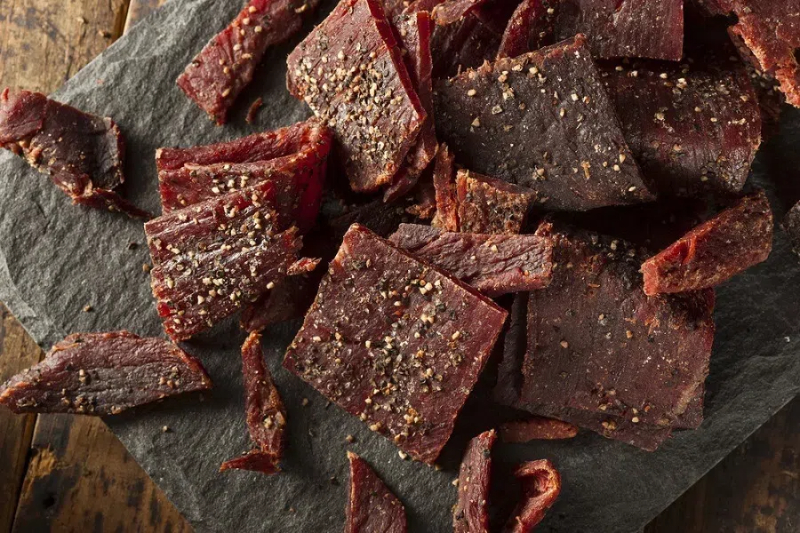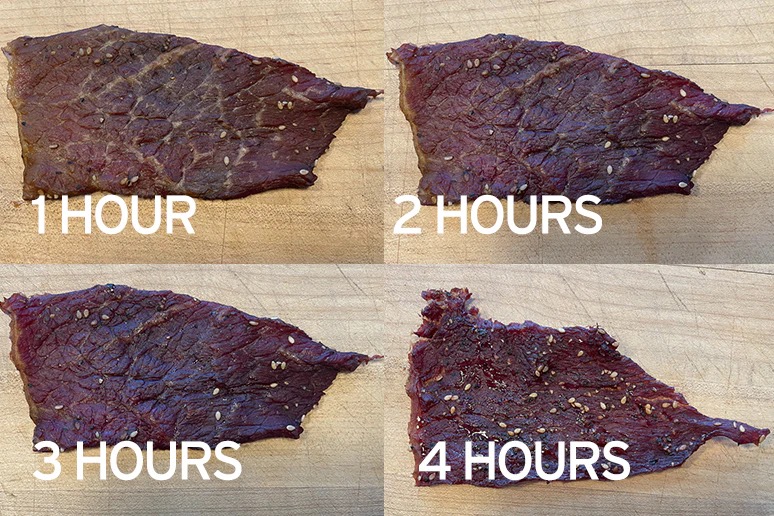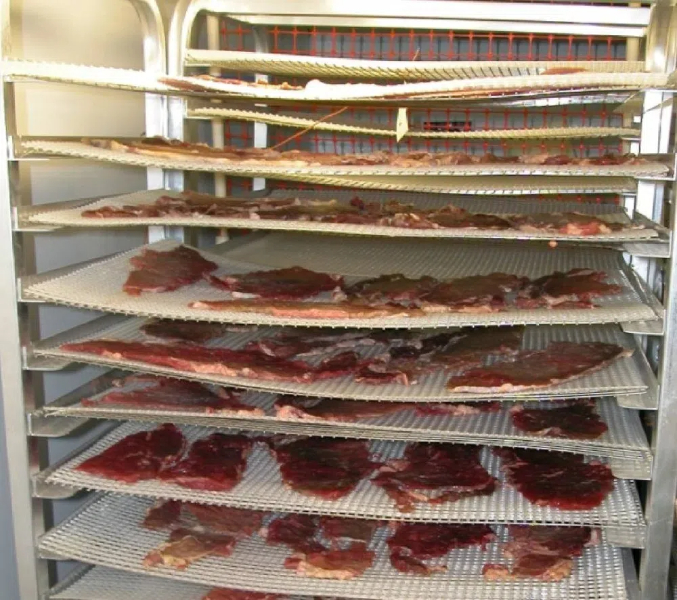
Content Menu
● Introduction to Dehydrating Jerky
>> Why Use a Dehydrator?
● Factors Affecting Dehydration Time
>> Ideal Temperature for Dehydrating Jerky
● Dehydrating Jerky in a 1000 Watt Machine
>> Step-by-Step Guide
● Tips for Achieving Perfect Jerky
● Advanced Techniques for Jerky Making
>> Using Different Meat Types
>> Experimenting with Marinades
>> Adding Spices and Seasonings
● Troubleshooting Common Issues
● Conclusion
● Frequently Asked Questions
>> 1. What is the ideal temperature for dehydrating jerky?
>> 2. How long does it take to dehydrate jerky in a 1000 watt machine?
>> 3. Can I use a marinade when making jerky?
>> 4. How do I know when the jerky is done?
>> 5. How should I store dehydrated jerky?
● Citations:
Dehydrating jerky is a popular method for preserving meat while maintaining its flavor and texture. When using a 1000 watt dehydrator, understanding the optimal dehydration time is crucial to achieve the perfect jerky. In this article, we will explore the process of dehydrating jerky, discuss the factors affecting dehydration time, and provide tips for using a 1000 watt machine.

Introduction to Dehydrating Jerky
Dehydrating jerky involves removing moisture from thinly sliced meat to create a dry, chewy snack. This process can be achieved using various methods, including oven drying, air drying, or using a dehydrator. Among these methods, using a dehydrator is the most efficient and controlled way to produce high-quality jerky.
Why Use a Dehydrator?
A dehydrator offers several advantages over other drying methods:
- Temperature Control: Dehydrators allow precise temperature control, which is essential for achieving the desired texture and ensuring food safety.
- Even Drying: They provide consistent airflow, ensuring that all pieces of jerky dry evenly.
- Efficiency: Dehydrators are faster than air drying and more energy-efficient than using an oven.
Factors Affecting Dehydration Time
The time it takes to dehydrate jerky in a 1000 watt machine depends on several factors:
1. Meat Thickness: Thicker slices require longer dehydration times.
2. Meat Type: Different types of meat have varying moisture contents and densities.
3. Marinade: The presence and composition of marinades can affect drying time.
4. Temperature: Higher temperatures generally reduce dehydration time but may affect texture.
Ideal Temperature for Dehydrating Jerky
The recommended temperature for dehydrating jerky is typically between 160°F to 165°F (71°C to 74°C). This range ensures that the jerky reaches a safe internal temperature while preserving its texture.
Dehydrating Jerky in a 1000 Watt Machine
When using a 1000 watt dehydrator, the dehydration time for jerky can vary based on the factors mentioned above. Generally, it takes about 4 to 6 hours to achieve the desired dryness and texture.
Step-by-Step Guide
1. Prepare the Meat: Slice the meat into thin strips, ideally about 1/4 inch thick.
2. Marinate (Optional): Apply your preferred marinade to enhance flavor.
3. Load the Dehydrator: Place the meat strips in a single layer on the dehydrator trays.
4. Set the Temperature and Time: Set the dehydrator to 160°F to 165°F and start the dehydration process.

Tips for Achieving Perfect Jerky
- Monitor Progress: Check the jerky every hour after the first three hours to ensure it reaches your desired texture.
- Bend Test: Jerky is ready when it bends and cracks but does not break.
- Cooling: Allow the jerky to cool completely before storing to prevent moisture accumulation.
Advanced Techniques for Jerky Making
Using Different Meat Types
- Beef Jerky: A classic choice, beef jerky is robust and flavorful.
- Turkey Jerky: Leaner than beef, turkey jerky is a great option for those looking for a lower-fat snack.
- Venison Jerky: For hunters, venison jerky is a delicious way to enjoy game meat.
Experimenting with Marinades
Marinades can significantly enhance the flavor of jerky. Common ingredients include soy sauce, garlic, and herbs like thyme or rosemary. Experimenting with different marinade recipes can help you find your perfect flavor profile.
Adding Spices and Seasonings
Spices and seasonings can add depth to your jerky. Consider using paprika for a smoky flavor or cayenne pepper for a spicy kick.
Troubleshooting Common Issues
- Over-Drying: If jerky becomes too brittle, it may be over-dried. Try reducing the dehydration time in future batches.
- Under-Drying: If jerky remains too moist, increase the dehydration time or check for uneven drying.
Conclusion
Dehydrating jerky in a 1000 watt machine is a straightforward process that requires attention to temperature, time, and meat thickness. By following these guidelines and tips, you can produce delicious, shelf-stable jerky at home. Whether you're a seasoned jerky maker or just starting out, experimenting with different meats and marinades can help you create unique flavors that suit your taste.

Frequently Asked Questions
1. What is the ideal temperature for dehydrating jerky?
The ideal temperature for dehydrating jerky is between 160°F to 165°F (71°C to 74°C) to ensure food safety and optimal texture.
2. How long does it take to dehydrate jerky in a 1000 watt machine?
Dehydrating jerky typically takes 4 to 6 hours, depending on meat thickness and type.
3. Can I use a marinade when making jerky?
Yes, marinades can enhance flavor but may affect dehydration time slightly.
4. How do I know when the jerky is done?
Jerky is ready when it bends and cracks but does not break. Check it regularly after the first three hours.
5. How should I store dehydrated jerky?
Store jerky in airtight containers or ziplock bags. If moisture accumulates, consider storing it in a paper bag for a few days to continue drying.
Citations:
[1] https://www.jerkyholic.com/how-to-make-beef-jerky-with-a-dehydrator/
[2] https://unimac.com/international/zh-hans/
[3] https://www.youtube.com/watch?v=Wj-xTmebJBQ
[4] https://www.tosei-corporation.co.jp/global/chinese/lp/cl_01/index.zh.html
[5] https://www.reddit.com/r/jerky/comments/lxk3o9/beef_jerky_dehydrating_time_and_temperature/
[6] https://huggingface.co/openbmb/cpm-bee-1b/commit/bd72a61dd7a59086ed7456f1dfcaa995c8ec58a3.diff
[7] https://backpackinglight.com/forums/topic/101139/
[8] https://www.cs.cmu.edu/afs/cs.cmu.edu/project/cmt-40/Nice/Transfer/Chinese/xferlexicon.txt











